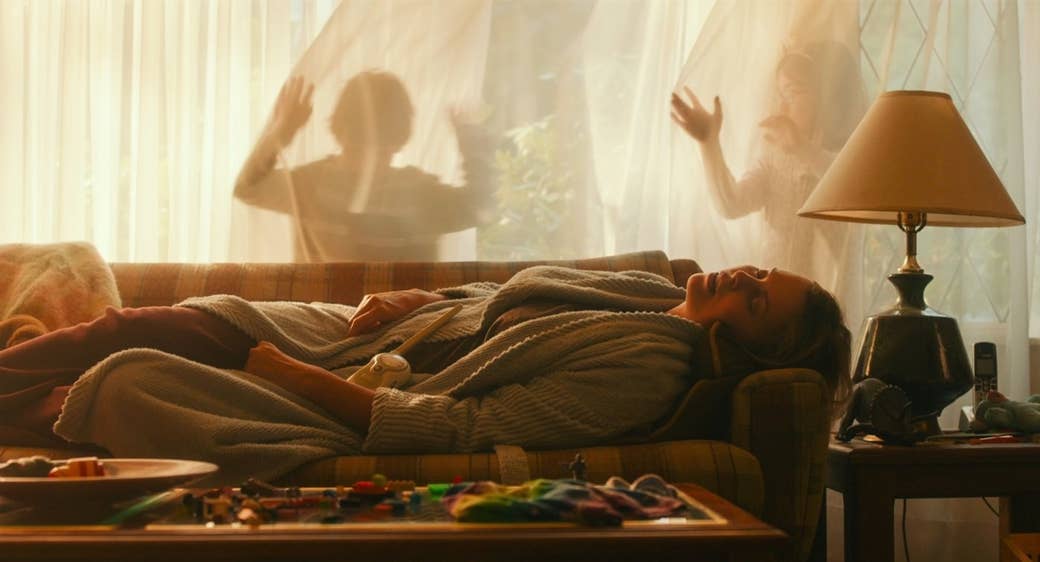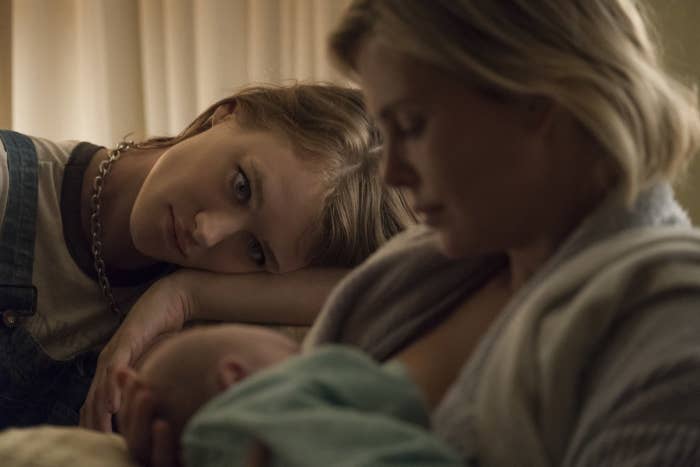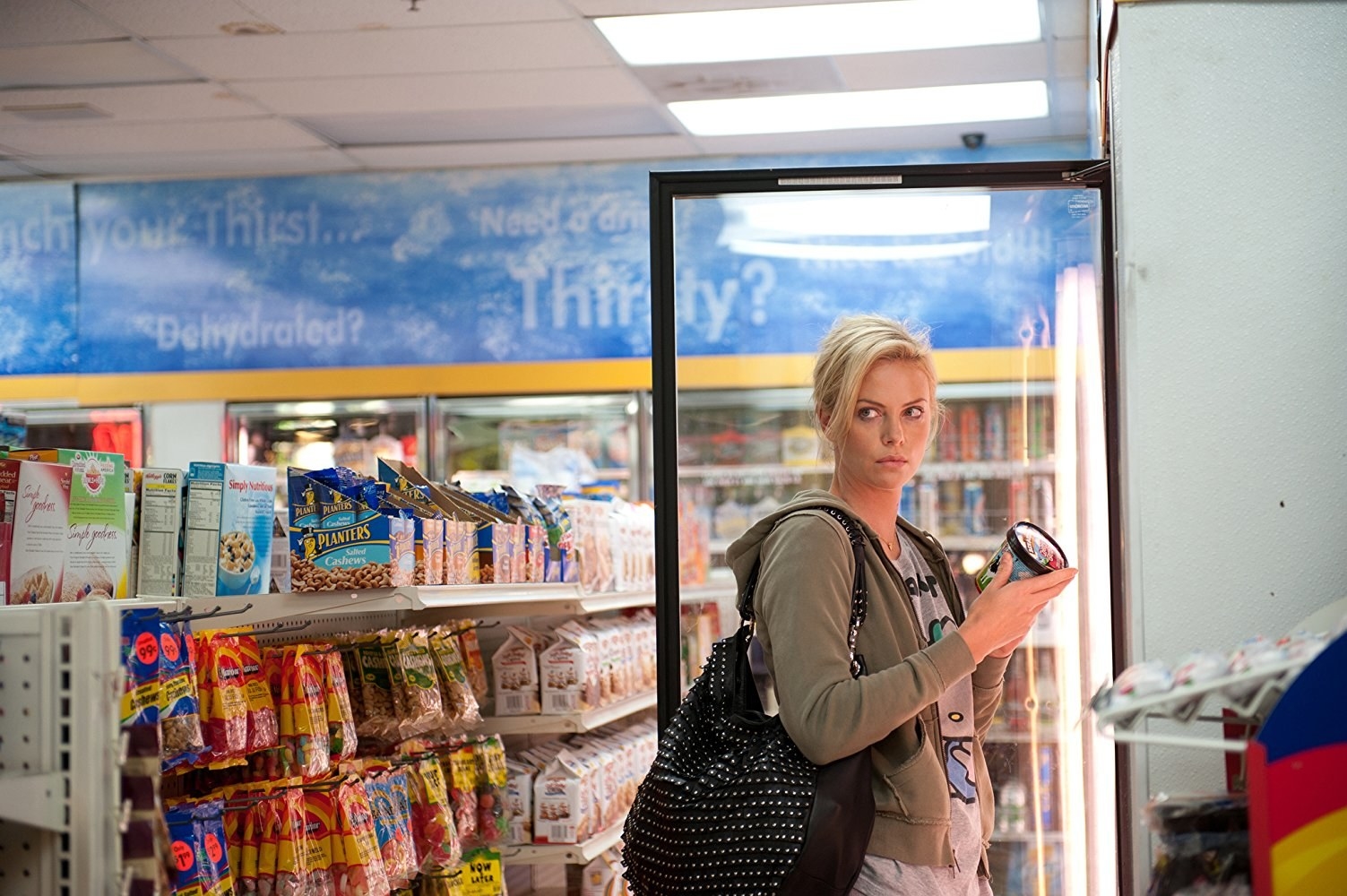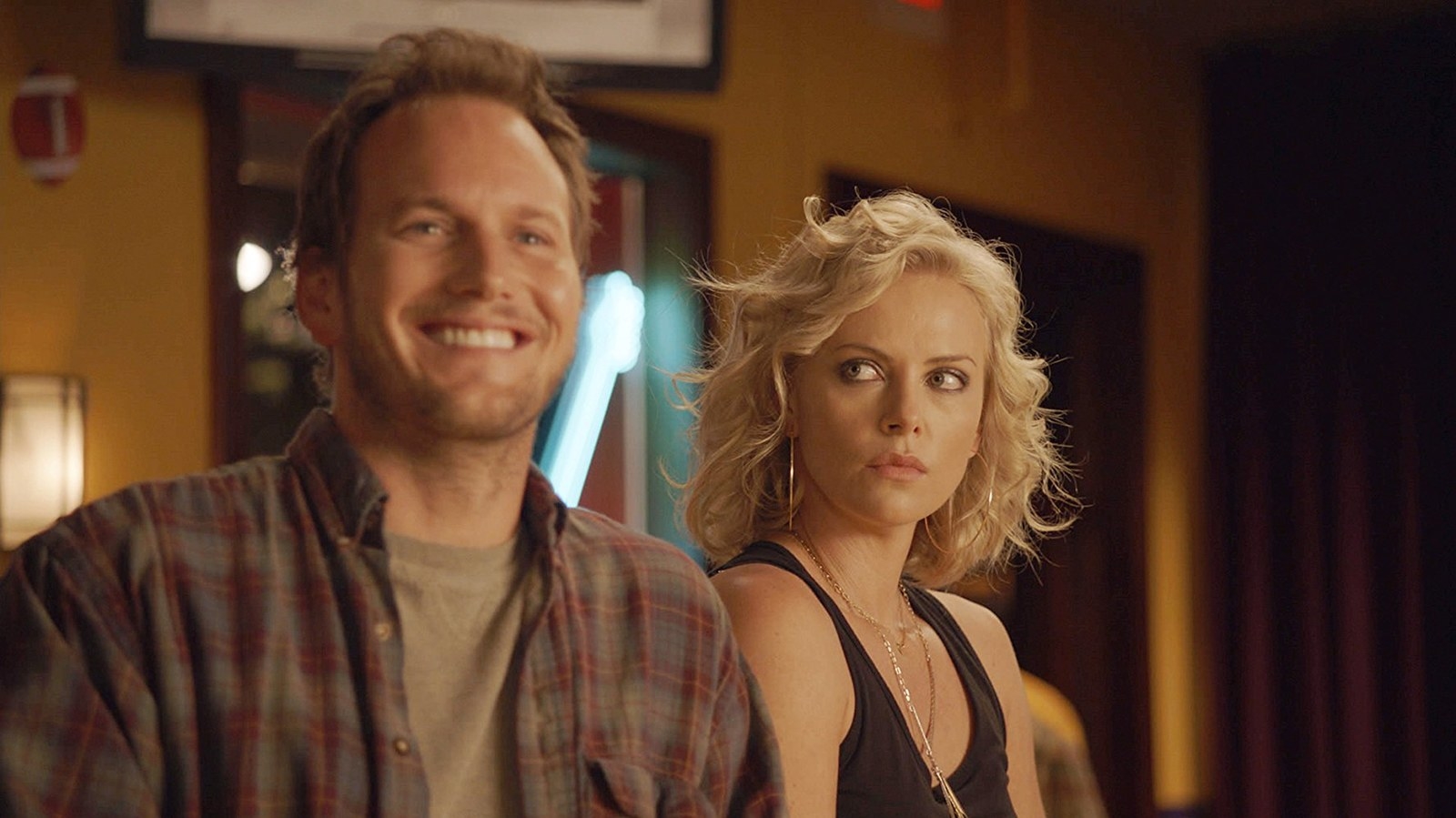
There's something almost perverse about the way Tully has been marketed as a montage of relatable parenting feels — of breast-pumping mishaps, post-pregnancy bodies, sleep deprivation, and hubbies who raise an eyebrow at frozen pizza for dinner again, oblivious to how exhausting the day has been before their return home from work. "This is a story about motherhood in 2018," a teaser trailer for the film declared, as accompanying droll piano tinkling transitioned to a soaring chorus that suggested all these struggles would be affirmed as “worth it” before the credits rolled.
It's not that these aren't all elements explored in the movie, which stars Charlize Theron as Marlo, a woman who's about to have her third child. It's that they're elements in a story about a character who may start off looking like an everymom, but who's soon revealed to be going through something far more raw and specific. Tully has already attracted the wrath of some corners of the “mommy world” on the internet who felt that they were sold a bill of goods: lured in with promises of funny maternal realness, only to be faced with a woman experiencing a psychotic break triggered by exhaustion, loneliness, and self-doubt.
The emotions Tully surfaces aren't comforting, and they have less to do with the actual realities of motherhood than with the idea of motherhood as something that leaves you forever changed and cut off from your younger self. It comes close to what is taboo territory with regard to the subject of children: regrets — though Marlo's are not about the life she's living so much as about the one she relinquished, and the parts of herself she gave up, in order to have it.

Tully is the third feature to come from the collaboration between director Jason Reitman and writer Diablo Cody. Their first project together was the quippy 2007 teen dramedy Juno, a movie that is, like Tully, about having a baby, but considerably cozier than this. Tully has more in common with their second film together, 2011's Young Adult, and not just because both movies star Charlize Theron in two of her career-best roles. The movies are fraternal twins, a pair of deceptively astringent women's midlife crisis movies set on opposite sides of a divide between having children and not. Their protagonists peer across at the other side, but the source of longing in these movies isn't for the ability to go back and opt for something else. It's for the ability to be able to go back to certain points in your life where choices didn’t feel so looming and permanent.
Attempts to reclaim a carefree youth are at the nexus of most midlife crisis movies, but Cody and Reitman give their versions a ferociously female tilt — albeit one centered steadily on a white, cis, middle-class experience of femininity — by having fertility lurk ominously in the background of both. Mavis, the divorced 37-year-old YA writer Theron plays in Young Adult, is inspired to flee her Minneapolis condo and impulsively head back to her hometown of Mercury, Minnesota, after receiving an emailed first baby announcement from her childhood sweetheart, Buddy (Patrick Wilson). If there's a matching inciting incident for Marlo, it would be her awkward run-in with her former roommate (and maybe ex) Violet in a coffee shop, the latter hip and poised and still living in the Bushwick loft they used to share, while Marlo is visibly drained from her ninth month of pregnancy. It's these glimpses into lives they didn't end up living that set both Marlo and Mavis spiraling.
Young Adult slowly coaxes the audience into sympathizing with Mavis, a fading queen bee who's had trouble letting go of her high school glory days, and who starts out hilariously awful even before she embarks on her alarming quest to "liberate" Buddy from domesticity ("babies are boring," she boozily insists). While Tully allows unease about what's happening to Marlo seep in just as gradually, dropping clues that what's going on is more Fight Club than Mary Poppins in the development of the relationship between her and Tully (Mackenzie Davis), the night nanny she hires to help out who turns out to be a hallucination of Marlo’s twentysomething self.

Cody’s main characters wouldn't like each other much — the self-centered mean girl who never really grew up and the Brooklyn hipster gone suburbanite — but that doesn't make them any less of a kind onscreen. They turn to reality TV as a form of palliative care (Mavis likes Kendra and the Kardashians while Marlo's particular pleasure is the Showtime series Gigolos), they like leather jackets, and they drink bourbon. They're also both contending with possible mental illness — Marlo's husband, Drew (Ron Livingston), hints at postpartum depression in her past, while there's an implication of an anxiety disorder in Mavis's compulsive hair-pulling and self-medicating with alcohol.
Cody's refusal to make these diagnoses more explicit has been criticized as an inadequately serious portrayal of mental illness. And her choices could certainly be seen as a hedge, an asterisk on any interpretation of the characters' increasingly unpredictable behavior as an observation about married moms or single ladies in a more general sense. But it's a choice that also liberates the films, because these characters’ experiences can't be parsed and are certainly no less valid for potentially being shaped by mental illness and the pressures put on women, sometimes by themselves.
Mavis, who gets described as a "psychotic prom queen bitch" and who sees the world through a willfully delusional and juvenile lens, isn't meant to be some symbol of hollow singledom. She's a woman who's unmoored and isolated, and while she might not have been happy as Buddy's wife in Mercury, she's in deep denial about the fact that he, and that life, might no longer be an option for her. Marlo isn't intended to be a portrait of postpartum psychosis either, though it's possible that's what she's experiencing when she hallucinates a twentysomething version of herself to serve as a helping hand and sounding board. She's someone who doesn't want to leave the husband she equates to a bench on a carousel and her sometimes challenging children, but she'd like to be able to reclaim the unencumbered vibrance of her youth — and its endless potential.

It's not an accident that Mavis and Marlo straddle 40, an age when, for women able to have children, considerations about wanting kids or wanting more kids than you already have start ramping up in tempo akin to a clock running out in a video game level. Marlo's third pregnancy was an unplanned surprise, and while she comes across as genuinely wanting the baby, she also seems like someone who'd previously thought herself finished with the childbearing portion of her life, and who'd maybe been happy about it. Young Adult’s Mavis, who comports herself like a coed with a paper due, soothing away hangovers with Diet Coke and killing time between casual encounters with video games, appears barely interested in caring for herself. But then late in the film, she talks about a years-ago miscarriage in a burst of undealt-with trauma, and about how she could have been the mother of a teenager by now, tucked away with Buddy in their childhood town — how, at one point, she did think she might have wanted the kind of life she now claims she's going to liberate her oblivious ex-love from. Ambivalence and pain can be found on either side of this gulf, and Cody doesn't suggest that either place is an inherently happier one. It's not children these films are about, really, but choice, which is why these women indulge in fantasies about going back to when they didn't have to feel the weight of making such life-altering ones.
There's a moment in Tully in which Marlo runs up to and rings the bell of her old apartment in Brooklyn, as if she could be buzzed up and walk right back into her life as a twentysomething, if only just to visit — a sequence reminiscent of the end of Jennifer Egan’s novel A Visit From the Goon Squad, a moment so steeped with the sense of time passing and options narrowing. Mavis’s retrograde comes in the form of achieving a drunken smooch with Buddy, who may not even remember it the next day, though it sure means something to her. She transforms it into teen drama prose as something "electric" and "transformative," as if she could will their story into the made-to-be romantic climax of a soap instead of the reality she refuses to contend with: "It was like their first kiss all over again, except now they knew exactly what they were doing."
The idea that you can go back for do-overs armed with some future knowledge is at the wistful heart of these movies — and made sharper and more bittersweet by considering it from such a decidedly female point of view. It's one informed by the timeline women are made to sweat over about being fuckable, being fertile, and being, eventually, rendered invisible, even to the people who love them. These are movies about women in crisis, but told with a light touch, the way women's stories often are, as if to disguise the depths of feeling found within. ●
